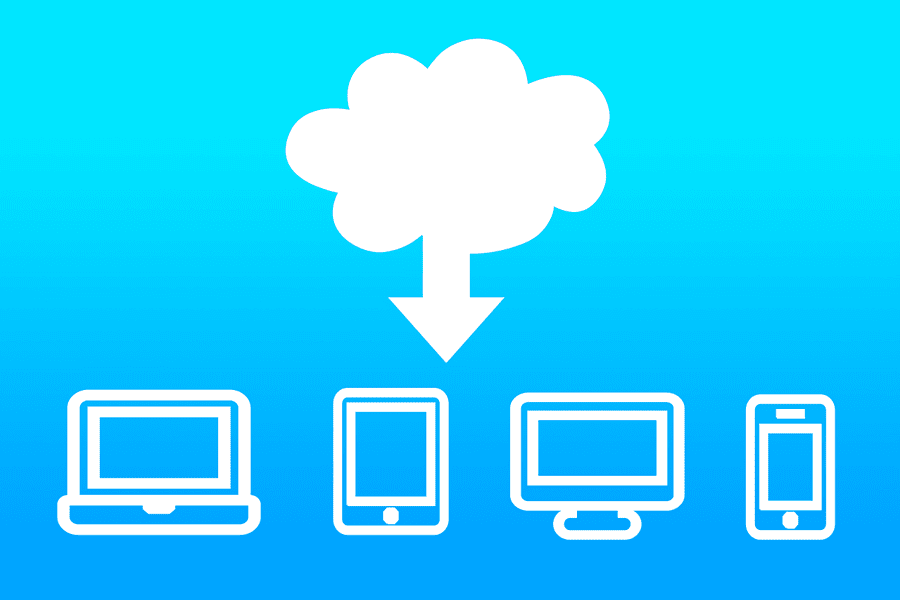One of the most important tech trends of a previous couple of years has been the shift to cloud computing (data processing). Once companies used to win their data centers.
These data centers are set to deflate about 32% of all the enterprise applications by the year 2022, which is roughly half of 2019.
What is a Cloud?
The data center lets users control the same files and apps from almost any other device as all the computing and storage is held on servers in a data center, instead of the user’s device.
This is the reason why a user can sign into their Facebook account on a different phone once their old phone breaks.
They somehow still can find their old account aligned, with all their conversations, videos, and photos.
It operates similarly with other cloud email providers such as Gmail or Microsoft Office 365, and also with data storage providers such as Dropbox or even Google Drive.
For businesses, changing to cloud computing eliminates some of the IT costs: for example, they won’t update and manage their servers, because the cloud vendor would do that for them.
Cloud Computing is quite magnificent for those small businesses that can’t afford their infrastructure, however, can easily outsource their infrastructure needs through the cloud.
For employees and customers connecting internationally, the online data is like a life-saver as they will be able to access information from any location or device they want to.
How does Cloud Computing Work?
It is within our eyes now due to a technology known as virtualization. It creates a simulated, digitally virtual computer that reacts like a physical computer that has its hardware.
The virtual machine is the technical term for such a computer. If perfectly integrated, virtual machines are isolated from one another on the same host machine, hence, they cannot interact with each other.
Also, the files are not visible from one virtual machine to the other although both of them are on the same machine.
Virtual machines also take advantage of the hardware hosting them and make them more efficient.
By operating several virtual machines, a single server becomes multiple servers, and a single data center can operate as a whole host of data centers. This in turn can serve multiple organizations.
Hence, cloud providers can provide their servers to a multitude of customers at a time and can do so at a low cost too.
Even when individual servers would be out of commission, online servers usually will always be online and available. Online data center vendors usually back their services upon several machines and towards different regions.
Users gain access to online data services either via browser or an app, joining the data over the Internet by many different interconnected networks despite the device they’re using.
Cloud Infrastructure Requirements are changing
This, in no way, means that public data are going somewhere. They’re supposed to grow potentially. A recent IDC study has shown that public online data expenditure will increase twofold by 2023.
Hence, lift and shift techniques that transfer assets into data applications are starting to become more mainstream than ever.
Although, regardless of this cloud computing trends, a considerable amount of companies were performing repatriation, or transferring some data and analyzing workloads through a public environment to a more private one.
Another study proves that by the year 2017, that transition was chosen by more than a third of companies. This included 36% of cloud-based organizations generating their computing platform in a private cloud.
Dropbox is the most prominent example of this kind of repatriation. It is the famous storage service that started from Amazon Web Services (AWS).
Dropbox simmered down its expenses by $74.6 million in the past two years since they repatriated the majority of their operations offering colocation services from public data to data centers.
Reasons why Companies are Flocking to Online Data Centers

1. Flexibility
Businesses with fluctuating or growing bandwidth demands will always choose cloud computing services. It is quite easier to increase your cloud capacity if your needs increase.
This flexibility also kicks in if you ever want to scale down again. This is the kind of cloud computing that would put companies at some advantage over their competitors. Better to hire cloud developer to get it done.
2. Let the online server Update your Software
One of the most prominent features of online data computing is that the servers are invisible.
All the managing is taken care of by the suppliers so that you do not waste any time updating the system by yourself.
This helps you to focus on the more important things such as growing your business.
3. Capital-Expenditure Free (Opex vs Capex)
Cloud computing services eliminates the over-the-top cost of hardware. All you need to do is pay and enjoy a subscription-centric app that does not burn your cash out.
In addition to that, including the convenience of setup and management and all of a sudden your scary IT project will look much friendlier. This is the right time to take the first step towards cloud adoption.
4. Low-Cost Disaster Recovery
All sizes of businesses must invest in robust disaster recovery, however, for businesses lacking the much-needed cash and expertise, this is just thought instead of reality.
More and more organizations are now able to get on the bandwagon due to cloud computing.
5. Competitiveness
If you wish to become more competitive in your field then migrating to the online server will offer you access to enterprise-level technology. Smaller businesses can act faster than bigger and more established competitors.
Online data business apps and pay-as-you-go can help small businesses to stand head to head against the industrial giants and disturb the market.
6. Work from Anywhere
If you have an internet connection then with online data computing you can be at work. Due to these services providing mobile apps, you are not limited by whichever device you have with you.
7. Security
Every year companies lose a billion dollars due to the loss of laptops. Although the cost of the device isn’t at stake here, it is the valuable data inside it.
Data computing provides you enhanced security whenever something like this happens to you. As your data is stored inside the cloud, you can control it regardless of whatever happens to your machine.
You can also locally eliminate data from your laptop so that no one else can access it except you.
8. Document Control
The higher the need for watertight document restriction, the more employees and partners there are to collaborate on documents.
Employees, before the cloud, had to transfer files back and forth through email attachments to get worked on a user at a time.
Also, in no time, there will be a mess of confusing file formats, titles, and content on your hard drive.
Complications keep on rising when even the smallest companies tend to become more globally acclaimed.
Research shows that 73% of knowledge workers join hands with people internationally living in different time zones and places monthly.
All this chaos can be avoided when you move to cloud computing where you can store all your files at the center.
Increased vision means enhanced collaboration that means a healthier and better work environment. If you are still old school, it might be time to change gears.
9. Increased Collaboration
Your teams can do more together by accessing, editing, and sharing documents anytime from anywhere.
File-sharing apps as well as cloud-based workflow provide them complete visibility in their collaborations and support them in making updates in real-time.
10. Eco-friendly
Even though there might be so many reasons why moving to the cloud can enhance the functionality of your business, the environment benefits a lot from it as well.
Your server capability goes up and down when your cloud needs to change. As a result, you only occupy the energy required and not more than that by leaving behind waste in the soil and leave our planet in shambles.
Synopsis
Cloud is a booming market especially in this pandemic. Given its unlimited benefits, it is quite clear why businesses are flocking towards this technology.
If you haven’t decided on it yet, hire a cloud developer to know the facts and how to make the best out of this technology.
All product and company names are trademarks™, registered® or copyright© trademarks of their respective holders. Use of them does not imply any affiliation with or endorsement by them.




 Insurance
Insurance

























